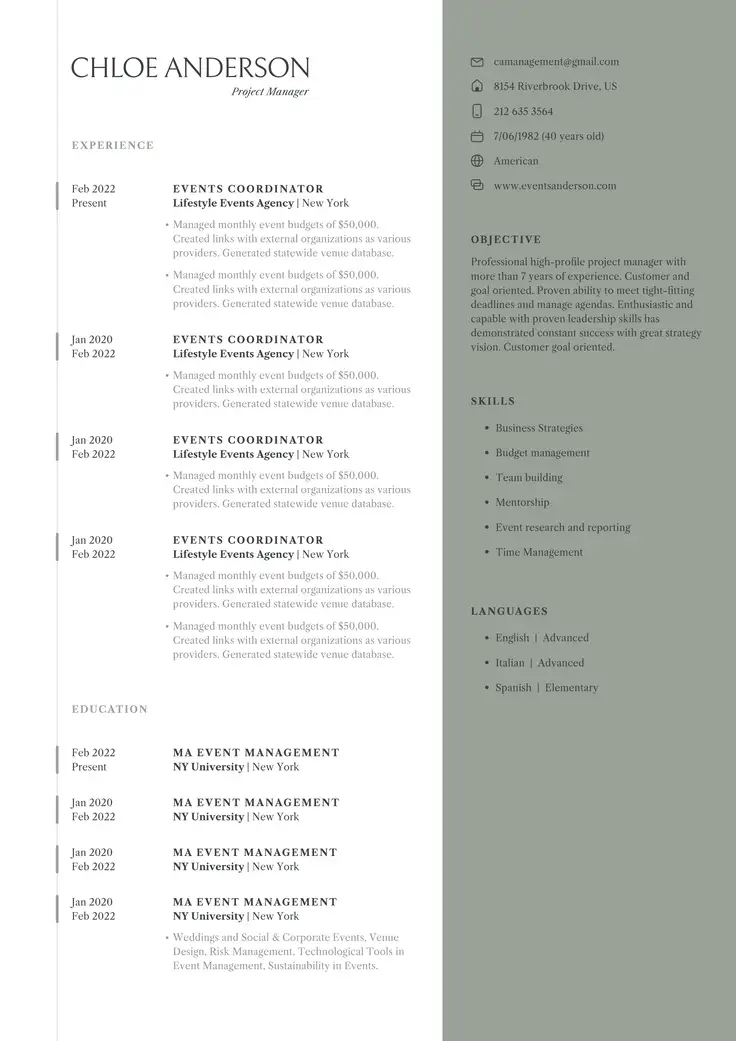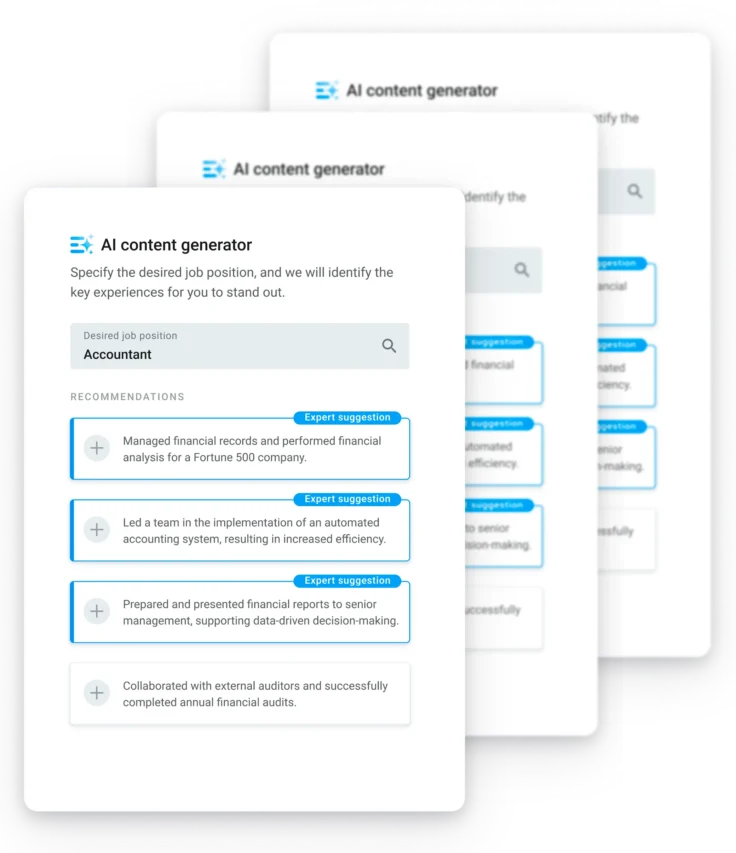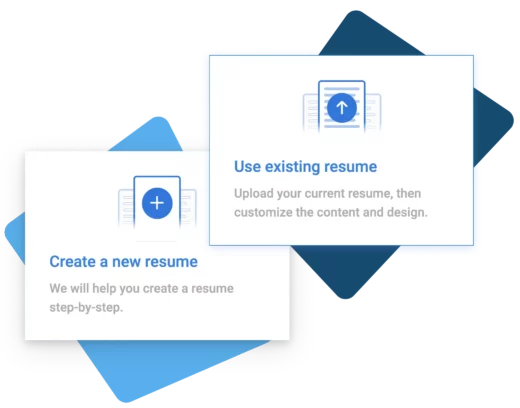How To Write a Resume
The ultimate step-by-step resume writing guide

A resume isn’t just a list of jobs you’ve held. It’s a strategic marketing document designed to tell a clear story about who you are, what you’re good at, and why a potential employer should want to meet you.
So what does it include? A resume is a summary of your personal education, professional experience, qualifications, and skills, all packaged into one document that supports your job application.
This resume writing guide will help guide you through the process. We’ll give you some tips for writing a great resume, and debunk every myth you’ve ever heard about how to write an effective resume. Follow along step by step to create a resume that will land you more interviews!
Components of a good resume
A good resume can become a great resume by improving its “readability” factor.
A standout resume is one that is easy to read. Resumes that cram too much information in small spaces can be hard for hiring managers to digest. Confusing layouts can force readers to toss your resume in the trash. A good resume has:
- Clear and accurate contact information
- A concise overview of your current and past employment
- Education history, key skills, and relevant details about your career goals
- A clean, easy-to-read structure with consistent formatting
- No grammatical errors or typos
Effective professional resumes, student resumes, graduate, and entry-level resumes are descriptive and intriguing in both format and layout. Keep reading to learn how to structure and write a resume that will help you stand out among the hundreds of other applicants.
How To Write a Resume Step-By-Step
A great resume is developed by focusing your writing on the employer’s needs. The job advertisement is your roadmap and a great resource for identifying the skills and qualifications to highlight in your resume.
The company job posting usually lists what the employer values most, including the required skills, experience, and qualifications an applicant needs to be successful in the role.
For example, if a job lists the need for data entry and customer service skills, be sure to tailor your resume to communicate any experience you have related to those skills.
💡TIP
Under no circumstance should you lie about your skills. According to research by CareerBuilder, 75% of HR recruiters have caught a lie on a resume, so they’ll likely spot any mistruths you publish.
Instead of stretching the truth, focus on leveraging your unique abilities and achievements to sell your candidacy. This can be done by making use of keywords and phrases from the job description. Remember to use them naturally and connect them to measurable achievements and outcomes.
-
💡 Our expert’s advice

Your bullet points should clearly state where and how you’ve applied your skills, providing specific examples.
The following step-by-step guide for how to start a resume is packed with tips and tricks for listing your professional experience and other details to position yourself as the ideal match for a job.
Upgrade Your Resume with AI-Powered Suggestions
Need a new resume? Simply enter your profession in the search bar and choose from AI-recommended results.
Powered by ChatGPT, our builder provides instant, natural language suggestions tailored for applicant tracking systems.
You can also choose to upload your existing for a full upgrade. Our AI resume builder will improve the wording, format, and optimize the keywords for ATS.

STEP 1: Choose the right format
Before putting together bullet points, you need to choose the resume format that will best showcase your career story.
There are 3 different types of resume layouts and formats most common in job searching: Chronological, Functional and Combined.
Each format has advantages and disadvantages, and they serve different purposes depending on your level of experience, career goals, and work history.
-
💡 Our expert says

Choosing the wrong format can accidentally highlight gaps, hide achievements, or confuse hiring managers.
- Chronological resume – Best for jobseekers with steady growth in one sector throughout their career. This ATS-friendly format is the one most recruiters and HR selection teams expect to see.
- Functional resume – Ideal for job seekers who have been self-employed,have gaps in their job history, career changers, or freelancers.
- Combination resume – Perfect for job seekers with a specific skill set or those looking to change career paths.
Learn more: For a more in-depth introduction to resume styles, read our guide on resume formats.
STEP 2: List your contact information and write an introduction
Apply a unique heading with your name and contact information. Usually, this includes your name, phone number, email, and any relevant online links.
Next, you will write an introduction. This is the first part hiring managers will read, and it needs to make a strong impression.
It will be a resume objective, summary statement, or qualifications summary, depending on your level of experience and career story.
Remember, the best intros are ones that grab the attention and are employer-focused.
Consider choosing the format that best matches your situation:
| Introduction Type | Best For | Format & Length | What to Include |
|---|---|---|---|
| Career Objective | Entry-level or no experience | 2–4 sentences | Career goals, enthusiasm, work ethic, transferable skills |
| Qualifications Summary | Career changers or professionals with diverse experience | 5–6 bullet points | Key achievements, key abilities, leadership, communication, technical skills |
| Professional Profile | Experienced candidates | 3–5 lines | Years of experience, areas of expertise, proven results |
Resume introduction examples
Here are resume introduction examples for each of these types, to help you get an idea of what each one should look like:
Career objective example
Career Objective
Proactive and creative marketing graduate seeking an entry-level marketing assistant role.Strong organizational skills, attention to detail, and enthusiasm for digital campaigns. Eager to apply classroom knowledge and internship experience to support company growth.
Qualifications summary example
Qualifications Summary
- Recognized for adaptability and problem-solving in fast-paced environments
- 7 years of experience in teaching, now transitioning to corporate training
- Strong leadership and classroom management skills
- Excellent communication and public speaking abilities
- Proven record of developing engaging learning materials
- Skilled in using technology to deliver interactive lessons
Professional profile example
Professional Summary
Project manager with 10+ years of experience leading cross-functional teams in the tech sector. Proven track record of delivering complex projects on time and under budget, utilizing and implementing agile methodologies, process improvement, and stakeholder communication strategies.
💡TIP
Always match your introduction to the job ad. Use the employer’s keywords and stress the skills they value most.
You won’t need to write an introduction from scratch. Our AI resume summary generator can give you a comprehensive summary that highlights your strengths, experience and qualifications in seconds.
STEP 3: Write your job history in reverse chronological order
Once you’ve got your base, get your resume into shape by filling out the meat of your resume: your employment history.
List each of your past jobs, starting with your most recent position, and work backward. For each position, include the company name, job title, dates worked, and location. Here are a few tips for writing effective resume content:
- Emphasize your industry-specific skills (especially those listed in the job description), but do not just copy and paste keywords from the job ad.
- Use action verbs throughout your resume. Words like “supported”; “increased”; “saved”; “co-ordinated”; and launched” can help describe your past contributions.
- Use the active voice to describe job roles and responsibilities for your current position and your introduction. Past tense should be used for previous employment entries.
Here’s a quick example:
Marketing Coordinator
XYZ Media, New York, NY — June 2021–present
- Manage multi-platform social media campaigns, driving a 25% increase in engagement within 6 months
- Coordinate cross-functional teams to execute promotions and events, improving campaign delivery times
Marketing Assistant
ABC Agency, New York, NY — Jan 2019–May 2021
- Supported market research initiatives and campaign analysis for national clients
- Prepared client presentations and reports, contributing to improved decision-making and client satisfaction
To optimize what you include in your work history section, research the position offered and the general company rules and environment to better understand the characteristics and attributes that the hiring managers are looking for.
Use this information to your advantage by highlighting your skills using strategic keywords taken from the job description or company branding.
Companies may employ Applicant Tracking System (ATS) to review all resumes they receive. This software will sort resumes and identify the ones most relevant to company needs. This software helps businesses save time by eliminating resumes that do not meet predetermined requirements, and therefore, do not need to be reviewed by the hiring team.
💡TIP
Forbes magazine estimates that it is vital to demonstrate your worth in the first 15 – 20 seconds of its reading to get results. This means that the top third of your resume must be the most intriguing.
STEP 4: Add additional sections relevant to your experience
A strong resume goes beyond job title and dates. While your work history does the heavy lifting, additional sections can provide context and depth. Especially if you’re early in your career, have specialized skills, or are changing industries.
It is always wise to further tailor your resume by adding additional subheadings that align with your background and qualifications. Think of these sections as supporting evidence.
The following list provides examples of additional sections in your resume:
- Skills
- Volunteer Work (especially if it demonstrates leadership or community impact)
- Honors and Awards
- Languages (valuable for global or customer-facing roles)
- Internships
- Publications
- Certifications
In each of the sections, try to be specific or include names and dates, as well as a brief description where possible. This information is beneficial for the employer because it allows them to know more about you beyond a list of professional achievements.
Plus, these sections can help add industry-related keywords in your document that will help the Applicant Tracking System score your resume as qualified.
STEP 5: How to end a resume
The way you close your resume matters. A strong ending gives your document balance and professionalism. Your goal is to end confidently without adding unnecessary information.
Here are a couple of ways you could end your resume:
- Hobbies and personal interests: Optional section. Add only if your personal interests add value, such as fitness, teamwork, or skills relevant to the role.
- Professional references: Do not list names and numbers. Instead, write “References available upon request.” This shows professionalism and saves space.
STEP 6: Finetune your document
After you have completed the base of your resume, it is time to review and fine-tune your resume to ensure nothing has been left to chance.
Follow this checklist to ensure your document is error-free and easy on the eyes.
- Create a left-hand margin and align your text. Note: If you used our resume builder or resume template, then the general page set-up is already done for you.
- Double-check readability factor: incorporate font characteristics such as bold, italic, or underline to bring attention to certain facts, define document headings, or differentiate between details.
- Maintain the same structure throughout and do not use more than two varying fonts.
- Proofread your resume! Review and edit your resume as necessary. Ask a peer or mentor to read through your docs to catch mistakes you may have missed.
Resume Length: How Long Should My Resume Be?
What is the ideal length for a resume? Professional opinions differ, but they all agree on one thing: relevance is key.
When it comes to resume length, it is important to keep them as brief and to the point as possible. A longer document isn’t always better.
💡TIP
Research by Talentworks shows that resumes over 600 words long are on average 43% worse at getting interviews than other, shorter documents.
The most widely accepted length for a resume is one to two A4 pages of text and information as well as one A4 page for a cover letter to accompany the application. Any extra information, certificates, or references can be separately attached.
This does not mean that you cannot write a longer resume, especially as you advance through your career. Some applicants (primarily academic and executive-level professionals) have a long list of relevant projects or have attended countless seminars or conferences. It is OK to include this in your resume as long as the information is suitable for the application.
Remember: you can attach a professional cover letter to your application, which may include additional space to elaborate on specific projects, skills, or experiences.
Resume Mistakes To Avoid
Even the best candidates lose opportunities because of simple resume errors. Recruiters see hundreds of applications daily, and these are the most common deal-breakers:
- Typos and grammar errors: Even one mistake signals carelessness. Always proofread or use a spell-check tool.
- Weak formatting: Overly creative designs, multiple fonts, or cramped text make resumes hard to scan. Stick to a clean, consistent layout.
- Too generic: Sending the same resume to every job rarely works. Tailor keywords and skills to match each posting.
- Incorrect contact details: Wrong phone numbers or outdated emails stop recruiters from reaching you. Double-check this section.
- Overloading with irrelevant info: Listing every job you’ve ever had, unrelated hobbies, or low GPAs distracts from what matters. Focus only on what supports your application.
- Missing achievements: Describing duties without measurable results weakens your impact. Use numbers, percentages, or specific outcomes to show success.
- Poor file choice: Submitting in Word may shift formatting. Unless specified otherwise, send resumes as PDFs for consistency.
- Not ATS-friendly: Using tables, graphics, or uncommon fonts can confuse Applicant Tracking Systems. Stick to simple formatting and include keywords naturally.
💡TIP
Compare your resume to the job ad line by line. If the employer asks for a skill or qualification, make sure it’s clearly visible in your document.
How To Write a Resume for Your First Job
Starting your career and unsure how to write a resume with no experience? Here are some quick tips to help you get started:
- Use a strong career objective to show enthusiasm.
- Highlight academic projects, internships, or volunteer work.
- Emphasize transferable skills like teamwork, customer service, or communication.
- Keep the format clean and ATS-friendly.
- Focus on potential and willingness to learn.
Ready to put it all together? Build your resume with our AI-powered resume builder and create a polished document that gets you hired faster.
Using AI To Write Your Resume
If you’re unsure what qualifications to include, our AI-powered resume builder can help make the process easier. Here’s how you can use suggestions given to you in our builder to quickly write your application:
- Write your intro: You can use our builder to suggest content for your objective or summary.
- Fill in different sections: The AI will provide tailored text proposals for your experience and skills. Review these suggestions and choose the ones that best reflect your professional journey.
- Personalize where you see fit: While the AI offers a strong starting point, adding your personal touch is key. Customize the text to align with your unique experiences and achievements more closely.
- Iterate for perfection: Don’t hesitate to experiment with different AI-generated proposals. This process helps in fine-tuning your resume to perfection.
By following these steps, you can create a resume that highlights your qualifications most effectively in minutes.

Instantly Enhance Your Resume with AI or Build a New One from Scratch
If you already have a resume, upload it and let our AI resume builder refine it automatically. Improve clarity, align your content with the job you’re targeting, and make sure your resume is easy for ATS systems and recruiters to scan.
You can also create a new resume from scratch with our AI tool. Just answer a few questions about your experience and the kind of job you’re looking for, and receive a professional, ATS-optimized resume.
Should I Use a Resume Template?
Resume templates are an excellent tool for jobseekers to use to create a winning resume without having to start from scratch.
There are different types of resume templates that are best suited for industry sectors, positions, and levels of experience. You can find resume samples for students, resume templates for professionals or even resume examples for entry-level jobs. The most common resume template follows the chronological resume format.
Resume examples allow applicants to customize their resume using the preformatted sections in the document and usually help applicants cut down on the time they spend creating a document from scratch.
They can also help if you’re applying for a job in a different country, and you’re not familiar with the standard formats used. For example, in Europe you may be asked to submit a Europass resume. Resume formats also differ between countries like France, Spain and Germany.
Writing a Resume From Scratch: Frequently Asked Questions
Still have some doubts about how to write your resume? Here are some of the most-searched questions about writing a resume.
You should proactively address gaps in your employment history. For example, you could use a “Career Break” or “Freelance Projects” label.
State the reason briefly (e.g. caregiver, travel, upskilling). Then highlight what you gained or learned from the experience. This turns gaps into deliberate choice rather than weakness.
Employment gaps don’t have to be a weakness. If you are confident in the decisions that you made and the skills acquired during breaks, it will put the hiring manager at ease!
Yes, especially now. Most employers want to know that you can thrive in both environments. Clearly label roles as “Remote” or “Hybrid” if they were performed offsite.
Add bullet points describing how you collaborated virtually, used digital tools, and met deadlines remotely. It shows adaptability and modern work competence.
Stick to the last 10–15 years (or last 3–4 roles). Older jobs rarely add value unless highly relevant. If earlier roles matter, include them in a brief “Additional Experience” section without full detail. This keeps your resume current and uncluttered.
Absolutely, if your side projects are relevant. Place them under “Projects” or “Relevant Experience.” Describe what you did (roles, impact, tools) and mention the skills you exercised.
A cover letter is essential for any serious job application and a great opportunity for candidates to expand on their experience and achievements.
Roughly 10 percent of recruiters consider missing cover letters a deal-breaking mistake. Don’t ruin your chances of an interview by not creating a personalized cover letter.
A cover letter should be one page, clear, and error-free. Use simple language to expand on your resume, showing why you want the job and how you’ll add value. Mention specific skills, achievements, or numbers that match the role.
Avoid repeating everything from your resume. Rather, add a new perspective to your cover letter and introduce information that cannot be easily included in the former.
Avoid generic statements, and make sure that you always tailor your letter to the company and position.
You can create a tailored cover letter in minutes with our AI cover letter generator. In seconds, you’ll have a professional, personalized cover letter, ready to send.

